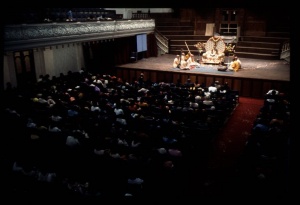SB 2.4.8

A.C. Bhaktivedanta Swami Prabhupada
TEXT 8
- nūnaṁ bhagavato brahman
- harer adbhuta-karmaṇaḥ
- durvibhāvyam ivābhāti
- kavibhiś cāpi ceṣṭitam
SYNONYMS
nūnam — still insufficient; bhagavataḥ — of the Personality of Godhead; brahman — O learned brāhmaṇa; hareḥ — of the Lord; adbhuta — wonderful; karmaṇaḥ — one who acts; durvibhāvyam — inconceivable; iva — like that; ābhāti — appears; kavibhiḥ — even by the highly learned; ca — also; api — in spite of; ceṣṭitam — being endeavored for.
TRANSLATION
O learned brāhmaṇa, the transcendental activities of the Lord are all wonderful, and they appear inconceivable because even great endeavors by many learned scholars have still proved insufficient for understanding them.
PURPORT
The acts of the Supreme Lord, in the creation of just this one universe, appear inconceivably wonderful. And there are innumerable universes, and all of them aggregated together are known as the created material world. And this part of His creation is only a fractional portion of the complete creation. The material world stands as a part only (ekāṁśena sthito jagat (BG 10.42)). Supposing that the material world is a display of one part of His energy, the remaining three parts consist of the vaikuṇṭha jagat or spiritual world described in the Bhagavad-gītā as mad-dhāma or sanātana-dhāma, or the eternal world. We have marked in the previous verse that He creates and again winds up the creation. This action is applicable only in the material world because the other, greater part of His creation, namely the Vaikuṇṭha world, is neither created nor annihilated; otherwise the Vaikuṇṭha-dhāma would not have been called eternal. The Lord exists with dhāma; His eternal name, quality, pastimes, entourage and personality are all a display of His different energies and expansions. The Lord is called anādi, or having no creator, and ādi, or the origin of all. We think in our own imperfect way that the Lord is also created, but the Vedānta informs us that He is not created. Rather, everything else is created by Him (nārāyaṇaḥ paro 'vyaktāt). Therefore, for the common man these are all very wonderful matters for consideration. Even for great scholars they are inconceivable, and thus such scholars present theories contradictory to one another. Even for the insignificant part of His creation, this particular universe, they have no complete information as to how far this limited space extends, or how many stars and planets are there, or the different conditions of those innumerable planets. Modern scientists have insufficient knowledge of all this. Some of them assert that there are one hundred million planets scattered all over space. In a news release from Moscow dated 2/21/60, the following piece of knowledge was relayed:
- "Russia's well-known professor of astronomy Boris Vorontsov-Veliaminov said that there must be an infinite number of planets in the universe inhabited by beings endowed with reason.
- "It could be that life similar to that on earth flourishes on such planets.
- "Doctor of Chemistry Nikolai Zhirov, covering the problem of atmosphere on other planets, pointed out that the organism of a Martian, for instance, could very well adapt itself to normal existence with a low body temperature.
- "He said that he felt that the gaseous composition of Martian atmosphere was quite suitable to sustain life of beings which have become adapted to it."
This adaptability of an organism to different varieties of planets is described in the Brahma-saṁhitā as vibhūti-bhinnam; i.e., each and every one of the innumerable planets within the universe is endowed with a particular type of atmosphere, and the living beings there are more perfectly advanced in science and psychology because of a better atmosphere. Vibhūti means "specific powers," and bhinnam means "variegated." Scientists who are attempting to explore outer space and are trying to reach other planets by mechanical arrangements must know for certain that organisms adapted to the atmosphere of earth cannot exist in the atmospheres of other planets (Easy Journey to Other planets). One has to prepare himself, therefore, to be transferred to a different planet after being relieved of the present body, as it is said in the Bhagavad-gītā (BG 9.25):
- yānti deva-vratā devān
- pitṟn yānti pitṛ-vratāḥ
- bhūtāni yānti bhūtejyā
- yānti mad-yājino 'pi mām
"Those who worship the demigods will take birth among the demigods, those who worship ghosts and spirits will take birth among such beings, and those who worship Me will live with Me."
Mahārāja Parīkṣit's statement regarding the workings of the creative energy of the Lord discloses that he knew everything of the process of creation. Why then did he ask Śukadeva Gosvāmī for such information? Mahārāja Parīkṣit, being a great emperor, a descendant of the Pāṇḍavas and a great devotee of Lord Kṛṣṇa, was quite able to know considerably about the creation of the world, but that much knowledge was not sufficient. He said therefore that even greatly learned scholars fail to know about that, even after great effort. The Lord is unlimited, and His activities are also unfathomed. With a limited source of knowledge and with imperfect senses, any living being, up to the standard of Brahmājī, the highest perfect living being within the universe, can never imagine knowing about the unlimited. We can know something of the unlimited when it is explained by the unlimited, as has been done by the Lord Himself in the unique statements of the Bhagavad-gītā, and it can also be known to some extent from realized souls like Śukadeva Gosvāmī, who learned it from Vyāsadeva, a disciple of Nārada, and thus the perfect knowledge can descend by the chain of disciplic succession only, and not by any form of experimental knowledge, old or modern.